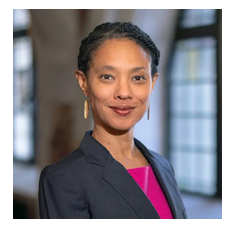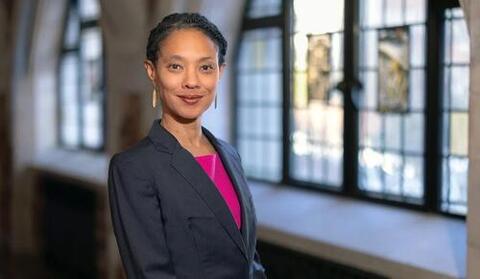Kaiama L. Glover Interviewed by Yale News

Professor Kaiama L. Glover, Professor of African American Studies and French, was interviewed by Yale News for their Office Hours Feature on March 4, 2024. Professor Kaiama L. Glover discusses her current research focus, what drew her to Yale, important projects to her in digital humanities, as well as other important instrests to her. Please see the full article and link to the Yale News site below.
Office Hours with… Kaiama L. Glover
In an interview with Yale News, Kaiama L. Glover discusses her scholarship at the nexus of French, francophone, Caribbean, and literary studies.
By Lisa Prevost
march 4, 2024

Kaiama L. Glover (Photo by Dan Renzetti)
As an undergraduate at Harvard, Kaiama L. Glover studied French and African American cultures as two separate areas of focus. Her professor and mentor, Henry Louis Gates Jr. (a 1973 graduate of Yale), suggested she think about the two cultures together. How and where do they intersect and influence each other in literature, in politics, in history?
That shift in outlook put Glover on the path to where she is today: a scholar of French, francophone, Caribbean, and Haitian literary studies. A professor of African American Studies in Yale’s Faculty of Arts and Sciences, Glover is an award-winning translator of francophone fiction and non-fiction, and a Whitney Humanities Center Fellow.
Her most recent book, “A Regarded Self: Caribbean Womanhood and the Ethics of Disorderly Being,” (Duke University Press, 2021), offers a reappraisal of the role of Caribbean women in literature by considering the “unruly” female protagonists, featured in novels by various Caribbean authors, who resisted societal constraints imposed upon them.
In the latest edition of “Office Hours,” a Q&A series that introduces new Yale faculty members to the broader community, Glover discusses the biography she’s working on, her digital humanities projects, and her love of dance.
| title | Professor of African American Studies and French |
|---|---|
| research interest | Black literature from the French- and Creole-speaking Caribbean |
| prior institution | Barnard College |
| started at yale | July 1, 2023 |
What is your current research focus?
Kaiama L. Glover: I’m working on a biography of René Depestre, a Haitian, former socialist militant, poet, and intellectual who was most active during the 20th century but, at 98 years old, continues to live and write today. His life and trajectory span five continents, 13 countries, and multiple cities.
Have you met him?
Glover: Oh yes. Over the past 10 years I’ve gone to visit him about once a year. It used to be for research, but now it’s kind of a check-up on him, to see how he’s doing and hear some of his stories and get some new details on those stories. He has become a treasured presence in my life.
You’re also immersed in the digital humanities. Are there projects that are particularly important to you?
Glover: I manage two big projects. One is this peer-reviewed journal called archipelagos | a journal of Caribbean digital praxis. We publish scholarly articles that live their best life online because they have an interactive component — music, sound and/or video.
Then the other project I’m co-working on with Alex Gil, a colleague here at Yale, is called “In the Same Boats.” It’s an interactive mapping visualization of the cross-border movements of Caribbean, Latin American, African, European, and Afro-American intellectuals throughout the second half of the 20th century and into the present day. The impetus of it was, in fact, the biography that I’m writing. Depestre is an extreme example of what Black intellectuals were doing during that period, kind of moving in networks that expanded beyond the borders of their national and linguistic identities.
You had people that, because of Pan-African interests during the Cold War and beyond — but also just because of the regional proximity of various parts of the Caribbean — were thinking together and imagining worlds together beyond their sort of one-to-one relationship with their respective former colonial powers. That seemed to me at odds with the way the academy is set up, where we are siloed into nation-language departments. The idea was that “Same Boats” would be an invitation for scholars to get the big picture of the movement of Black intellectuals, artists, political figures across the Black Atlantic world and beyond.
What drew you to Yale?
Glover: Partly the fact that Yale had just hired Marlene Daut, a very good friend and collaborator in the French and African American Studies departments, and then also my other cherished collaborator, Alex Gil, in the Department of Spanish and Portuguese. It seemed to me that Yale was really doing a thing that I wanted to be a part of: developing the infrastructure for Caribbean studies across nation-language boundaries, thinking digitally, and thinking about Blackness and France globally.
Aside from translating, what do you do for fun?
Glover: I dance and I see dance. Modern dance, primarily modern jazz dance. That was my great passion when I was young and spry and continues to be something that I pay a lot of attention to. I used to run a little dance company when I was an undergraduate. It was a happy place for me.